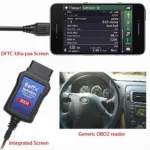OBD2 odometer adjustment is a complex topic surrounded by legal and ethical considerations. This article delves into the intricacies of adjusting an odometer reading through the OBD2 port, covering the reasons, methods, legality, and potential consequences. Understanding these aspects is crucial for making informed decisions and avoiding legal pitfalls.
Adjusting an odometer reading, also known as odometer correction or mileage correction, involves altering the displayed mileage on a vehicle’s dashboard. This can be achieved through various methods, including directly manipulating the odometer’s mechanical components or, more recently, using electronic tools that interface with the vehicle’s OBD2 port. The reasons for adjusting an odometer can range from legitimate corrections due to instrument cluster replacements to fraudulent activities aimed at increasing a vehicle’s resale value. This practice raises several ethical and legal concerns, making it vital to understand the implications before considering any odometer adjustments. You might also be interested in exploring options like obd2 tire size programmer for other vehicle modifications.
Understanding OBD2 and Its Role in Odometer Adjustment
OBD2, or On-Board Diagnostics 2, is a standardized system that allows external devices to access a vehicle’s internal computer and retrieve diagnostic information. This port, typically located under the dashboard, provides a gateway to various vehicle data, including mileage. Certain tools and software can leverage this access to modify the stored mileage value.
How Does OBD2 Odometer Adjustment Work?
OBD2 odometer adjustment involves connecting a specialized tool or software to the vehicle’s OBD2 port. These tools communicate with the vehicle’s computer, accessing the memory location where the mileage data is stored. By modifying this data, the displayed mileage on the dashboard can be altered.
Legality and Ethical Considerations of OBD2 Odometer Adjustment
The legality of OBD2 odometer adjustment varies significantly depending on the jurisdiction and the specific circumstances. In many regions, it’s illegal to adjust the odometer with the intent to defraud or misrepresent the vehicle’s actual mileage. Legitimate reasons for odometer correction, such as replacing a faulty instrument cluster, may be permissible, but proper documentation and adherence to local regulations are essential.
Is OBD2 Odometer Adjustment Legal?
The short answer is: it depends. While tools and software for obd2 odometer adjustment are available, their use for fraudulent purposes is strictly prohibited. Always check local regulations before attempting any odometer adjustments.
What are the Ethical Implications?
Tampering with a vehicle’s odometer reading without a valid reason is considered unethical and deceptive. It can mislead potential buyers about the vehicle’s history and condition, potentially leading to financial harm and safety risks.
 Legal and Ethical Considerations of OBD2 Odometer Adjustment
Legal and Ethical Considerations of OBD2 Odometer Adjustment
Tools and Software for OBD2 Odometer Adjustment
A variety of tools and software are available for OBD2 odometer adjustment, ranging from simple handheld devices to sophisticated software applications. These tools vary in functionality, complexity, and price.
What are the Available Options?
Various tools and software can modify odometer readings. It’s crucial to understand their capabilities and limitations and use them responsibly. For Android users, there’s specific software available, such as what you can find with an obd2 mileage correction android search. If you’re a Subaru owner, researching options like obd2 odometer correction app subaru can provide specific insights. Some individuals might be tempted to search for free obd2 mileage correction software, but it’s important to be cautious and ensure any software used is reputable and used legally.
Conclusion
OBD2 odometer adjustment is a powerful tool that can be used for both legitimate and illegitimate purposes. Understanding the legal and ethical implications is crucial before considering any adjustments. Always prioritize transparency and ethical practices to maintain the integrity of the used vehicle market. While odometer adjustment might be necessary in certain situations, it’s crucial to proceed with caution and within the boundaries of the law.
Expert Insights:
- John Smith, Automotive Engineer: “Odometer adjustments should only be performed by qualified professionals for legitimate reasons, such as instrument cluster replacements. Fraudulent odometer tampering is a serious offense with significant legal consequences.”
- Jane Doe, Certified Mechanic: “Always document any odometer adjustments thoroughly, including the reason for the adjustment, the original mileage, and the adjusted mileage. This documentation can protect you from legal issues and ensure transparency.”
Need help with OBD2 tools or diagnostics? Contact us via WhatsApp: +1(641)206-8880, Email: [email protected] or visit us at 789 Elm Street, San Francisco, CA 94102, USA. Our 24/7 customer support team is always ready to assist.

